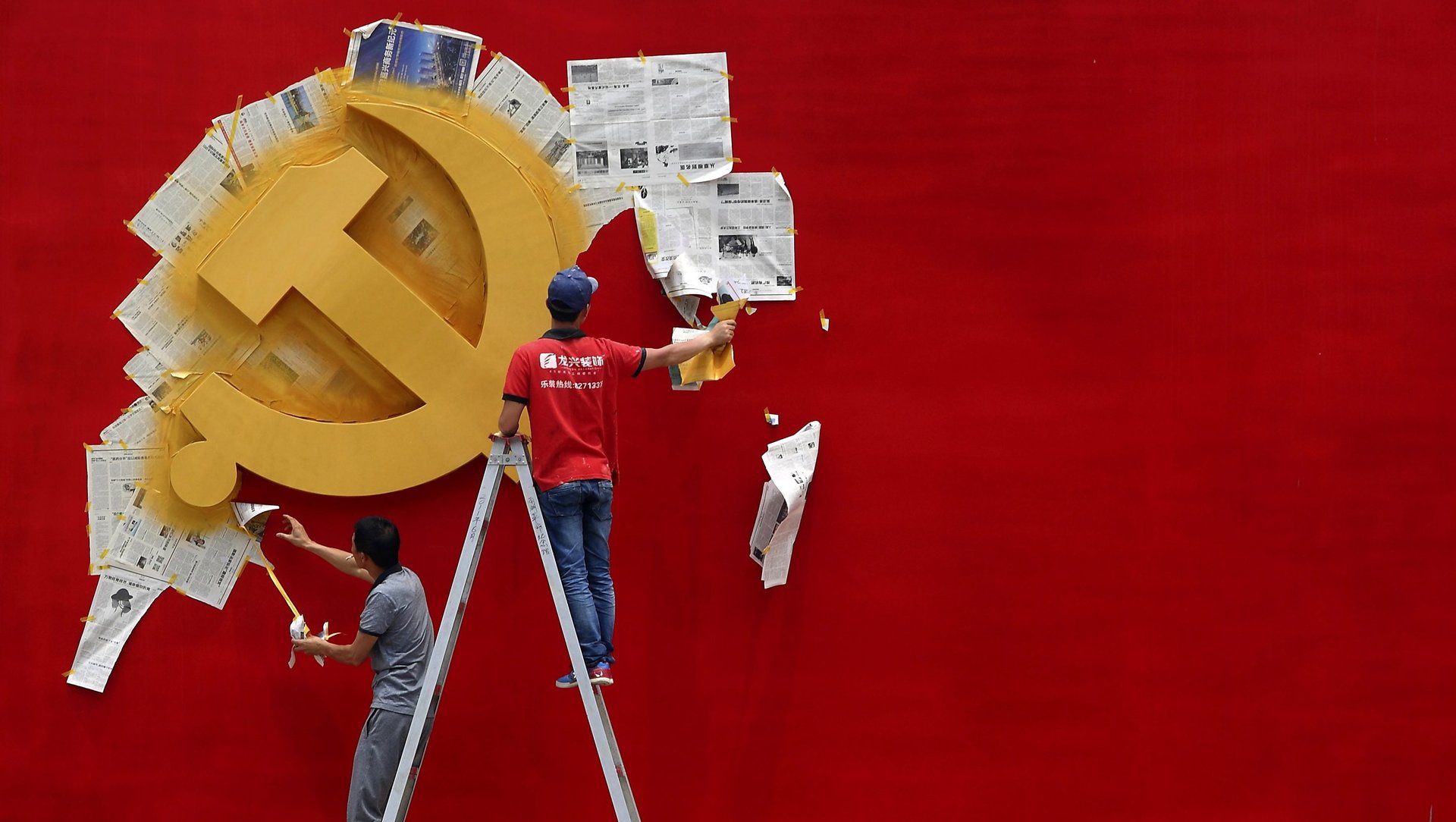How to smear your enemies and silence your critics, Chinese Communist Party style
When Hong Kong bookseller Lam Wing-kee decided that he was going to hold a press conference to reveal what had happened to him after he disappeared for months into China, he had to know the stakes were high.


When Hong Kong bookseller Lam Wing-kee decided that he was going to hold a press conference to reveal what had happened to him after he disappeared for months into China, he had to know the stakes were high.
To the Chinese Communist Party regime that thrives on the control of information, the very act of distributing a different account of events is defiance on a major scale. Lam was a political target before, enough to be arrested and kept in illegal detention with no access to lawyers for months. Now a full on smear-campaign is underway.
Everyone from his girlfriend to his ex-colleagues to various officials have publicly called him a liar and worse.
The approach, however ugly, is nothing new: smear campaigns have long been convenient political tools for Beijing, trotted out at the very time a political enemy or critic gathers supporters inside or outside China. They’re typically run alongside even more brutal and threatening campaigns aimed a shutting down the party’s critics.
In fact, you could even say there’s a playbook—and it looks something like this:
Step 1: Attack the person, not the politics
Go after your target’s character, without addressing the government actions they are complaining about. This is particularly effective when you have complete control of the media, as is the case inside mainland China.
When artist Ai Weiwei was arrested in April 2011, he was in the midst of producing politically-charged art that challenged the official accounts about thousands of children killed by the Sichuan earthquake. Ai was charged in June of the same year only for tax irregularities.
His political opinions, and his project, were never mentioned.

Lawyer Xu Zhiyong, who tried to provide legal counsel to the relatives of the children made ill by the 2008 contaminated milk scandal in China, was accused of tax related offenses in 2009, and detained for several months. The founder of the New Citizen Movement, a group of lawyers pushing for greater rights in China, he is now serving 4 years in jail for “disturbing public order,” another common charge against activists that suggests trouble-making, rather than dissent.
Labor activist Zeng Feiyang, who spent years organizing factory workers in Guangdong province who wanted better wages, fair working hours, and their lawful benefits, was arrested last December. In a lengthy report, state newswire Xinhua detailed charges of adultery, fraud, embezzlement and other crimes—charges workers who know Zeng say they find impossible to believe.
In Hong Kong, others have undergone similar treatment, even though the city’s press is not censored outright by Beijing.
In 2004 Alex Ho, a prominent and vocal member of the Democratic Party, was arrested and accused of visiting prostitutes in Dongguan during his election campaign for the Legislative Council. After six months in jail, Ho emerged saying he had not hired a prostitute and his confession had been forced.
“Wherever there is no concrete evidence to charge a person, they will go resort to a kind of character assassination,” explains Ching Cheong, a former journalist for the Singaporean Straits Times in Hong Kong, who was arrested in China in 2005 and accused of being a spy. “They will go after anything, real or invented.”
Step 2: Force a confession
The Cultural Revolution had public confessions in improvised “people’s tribunals” in schools and major streets. A more modern approach is the televised confession on China’s state-controlled media. These confessions happen before a trial, in direct contradiction to the party’s pledge to strengthen the rule of law.
Hong Kong booksellers Gui Minhai and Lee Bo were subjected to this treatment, one admitting to a 2003 hit-and-run accident and the other claiming to be appalled by the titles he used to publish beforehand.
Just this January, Swedish activist Peter Dahlin confessed on Chinese TV to running an “illegal organization” and “encouraging the masses to oppose the government” before being deported.
Respected journalist Gao Yu was forced to give a televised confession after being arrested at age 70, in which she “admitted” to revealing State secrets, then retracted her confession during her trial. Charles Xue, a Chinese American venture capitalist who was a prominent online commentator with a fan base that apparently scared party officials, confessed on CCTV that he was, in fact, addicted to soliciting prostitutes.
Step 3: Go after the family
When you can’t silence a critic, pressure their family to be silent instead—or to participate in the smear campaign themselves.
“You can see a pattern from other cases,” says Patrick Poon, China researcher for Amnesty International: “your family and friends are put under pressure to say things against you.” But, he added, that is “carefully done only through the mainland media” which is tightly censored, so no dissenting accounts can appear.
Ai’s 76-year old mother was interrogated by plainclothes police in her own home as the government tried to silence his earthquake project. The wife of jailed Chinese dissident Liu Xiaobo has been under house arrest for years. Bao Zhuoxuan, the teenage son of jailed human rights lawyer Wang Yu, is reportedly under house arrest in northern China after trying to flee to the United States.
Just weeks after labor activist Zeng’s mother filed a lawsuit against Xinhua, alleging they had defamed her son, she dropped the suit after relentless harassment by local authorities. The school where Zeng’s wife taught threatened to fire her if she didn’t keep a low profile, and even his cousins were harassed with threatening phone calls.
While Lam spoke out, Hong Kong’s other “missing” booksellers did not, because they have family on the mainland who are under pressure, he and others believe. Gui’s daughter is the only family member of the booksellers to speak up. She testified in front of the US Congress about his abduction, even though her father told her to keep quiet, she said. “I believe he would have spoken up if it had been me,” she said.
Martin Lee one of the fathers of the pro-democracy movement in Hong Kong and a respected lawyer and democracy advocate, was dubbed a “traitor” by former Chinese vice-minister of Commerce, An Min, in 2004, as was his father. His father Li Yin-wo, was a Kuomintang (Nationalist Party) general during the Second World War, fighting against the Japanese.
Other character assassinations have been meted out to the families of Chinese president Xi Jinping’s high-level political rivals already in jail, like Zhou Yongkang, former member of the Politburo, now serving a life sentence for corruption.
This week Zhou’s son and wife were accused of corruption, and handed down sentences of 18 and 9 years respectively. Even before the sentencing, speculation swirled about Zhou’s much younger wife, who he married just a year after his first wife’s mysterious death in a car crash.
Step 4. Cherchez la femme
A good smear campaign is always better with a bit of a sex scandal, the more humiliating the better. In the case of bookseller Lam, a woman claiming to be his girlfriend was interviewed in a secret location by pro-Beijing newspaper Sing Tao. In the interview, she says that Lam is not “manly enough”, and has given “a bad name” to Hong Kong men–hinting at sexual practices unworthy of a more masculine lover.
Ching, the Straits Times journalist, was arrested after going to China to research the existence of a memoir by reformist Party leader Zhao Ziyang, who died that year. A married man with a stellar reputation, he was accused of having a mistress. “For a while, they found it difficult to convince the general public that I could be guilty of espionage,” Ching said. “So they said I had a mistress, and I had sold state secrets to get more money for her.”
The woman in question, who was also working on the book, was smuggled out of China by Democratic Party lawmaker Albert Ho, and she said at a press conference in Hong Kong the two were nothing more than coworkers. “For a while, though, it got people confused, some people became hesitant to support me,” Ching recalls.
If your target is female, of course, you can look for a man—or, question why there isn’t one, as in the case of Taiwan’s new president Tsai Ing-wen who was described as “emotional” and “extreme” because she is a “single female politician” by a Beijing official.
Step 5: Instill fear
If you’ve done steps one through four correctly, you’re pretty much guaranteed to arrive at step five.
Beijing’s smear campaigns and pressure on families are so prevalent that some people don’t speak out against government policies or actions they think are unfair, because of the threat of them.
“It is a combination of weapons,” Lee, the Hong Kong Democratic Party co-founder said. “This kind of smear campaigns is most successful at instilling fear. Just the threat of them is enough, you do not even need to use these tactics, if people are sufficiently scared of them.”
An earlier version of this article mistakenly said journalist Gao Yu was released hours after her televised confession. Her release was announced hours after a second confession in the form of a guilty plea in a Beijing court.